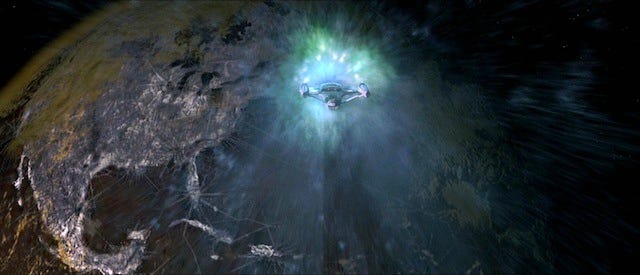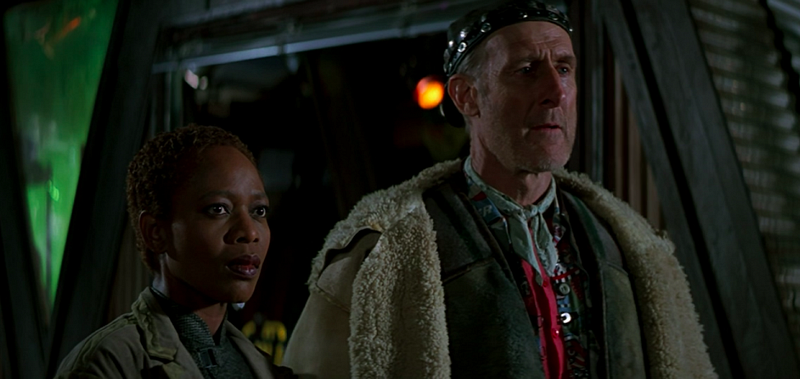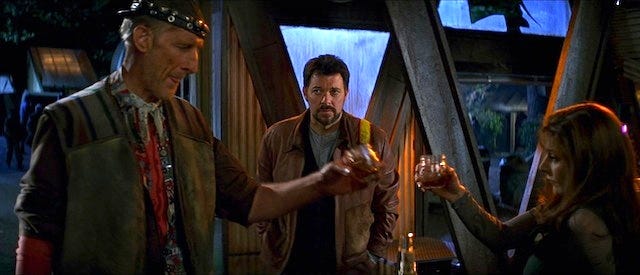Exploring Humanity's Future: The Legacy of Star Trek
Written on
Chapter 1: Time Travel and the Star Trek Legacy
While channel surfing, I happily rediscovered “Star Trek: First Contact” (1996). As a devoted fan of science fiction, this film ranks high on my list for repeated viewings. For those unfamiliar with this segment of the franchise, Captain Picard leads his Enterprise crew back to the year 2063 to confront an alien threat from the 24th century that has altered Earth's timeline. In the 21st century, humanity is ill-equipped to defend itself against such an advanced invasion, especially when our current capabilities barely prepare us for a catastrophic meteor impact. Thus, the crew of Star Trek must work diligently to thwart the attempts of these extraterrestrial invaders.

Chapter 2: The Foundations of Star Trek Mythos
A notable highlight of this film is the introduction of pivotal human characters who significantly contribute to the enduring Star Trek mythology, which has thrived for over six decades since the original series debuted. “First Contact” illustrates Gene Roddenberry's vision of humanity's quest for the stars through warp technology. This advancement in travel elevates Earth's technological status, attracting the attention of an interstellar race. The film captures the genesis of the United Federation of Planets.

Additionally, the movie unveils the backstory regarding Earth’s condition. Roddenberry proposed that a third world war devastated much of civilization in the 21st century, leaving survivors to scavenge in a post-apocalyptic environment. This tragic backdrop makes the pursuit of new life and civilizations a noble endeavor.
The political climate in the 1960s was rife with cold war tensions that threatened to escalate into a nuclear confrontation. The infamous Bay of Pigs incident in 1961 serves as a stark example of this volatility, as Americans feared the potential placement of Soviet missiles in Cuba. Roddenberry drew upon the anxieties of the era, pushing this narrative to its dire conclusion, even though the immediate aftermath of the war was never explicitly shown in the series. Instead, it was implied as a marker of humanity's progress.
Fortunately, human wisdom and instincts for survival have prevented the third world war from occurring. In fact, our world has become more interconnected than ever, partly due to technological advances envisioned in Star Trek. Handheld devices, once considered fanciful in the 1960s, are now ubiquitous. The series hinted at the internet through its portrayal of instantaneous communication across the universe. Moreover, civilians like William Shatner, who portrayed Captain Kirk, now venture into space aboard commercial spacecraft. The medical tricorder is closer to becoming a reality, and telescopes like Hubble and the forthcoming James Webb are probing the depths of space. These innovations have largely emerged from periods of peace and prosperity, suggesting we may be on the verge of achieving a breakthrough akin to that of Zefram Cochrane, leading us toward a mindset focused on altruism, equity, and peace rather than fear and conflict.

Chapter 3: The Path Forward for Humanity
In “Star Trek: First Contact,” humanity's remnants evolve both intellectually and technologically to be embraced by a broader galactic community. With the year 2063 only 41 years away, will we maintain our upward trajectory toward establishing “first contact” with extraterrestrial beings, or must we first experience an apocalyptic reset to unify under a shared purpose of altruism?
Recent events, including the January 6, 2021 insurrection and the tragic deaths of George Floyd and Ahmaud Arbery, have exposed the pervasive systemic racism that continues to plague America. Political tensions have intensified, especially during the tenure of a corrupt administration that prioritized “America First.” Meanwhile, global powers like China and Russia remain under authoritarian leadership, perpetuating propaganda against their adversaries. North Korea's missile tests under its current dictator further illustrate the challenges we face. These developments cast a shadow over our potential to rise above petty human differences and join an interstellar community.
As time progresses, will humanity attain the enlightened state necessary for peaceful extraterrestrial life to initiate contact? Only time will tell.
The first video titled "1st Reaction - Star Trek: Discovery S5E10 'Life, Itself'" captures viewers’ reactions to pivotal moments in this Star Trek installment, providing insight into the evolving narrative of the franchise.
In the second video, "Viewer's Choice - Best 2 Parters in Star Trek Ranked Tiered List," fans rank their favorite two-part episodes, highlighting the series' rich storytelling and character development.
References: